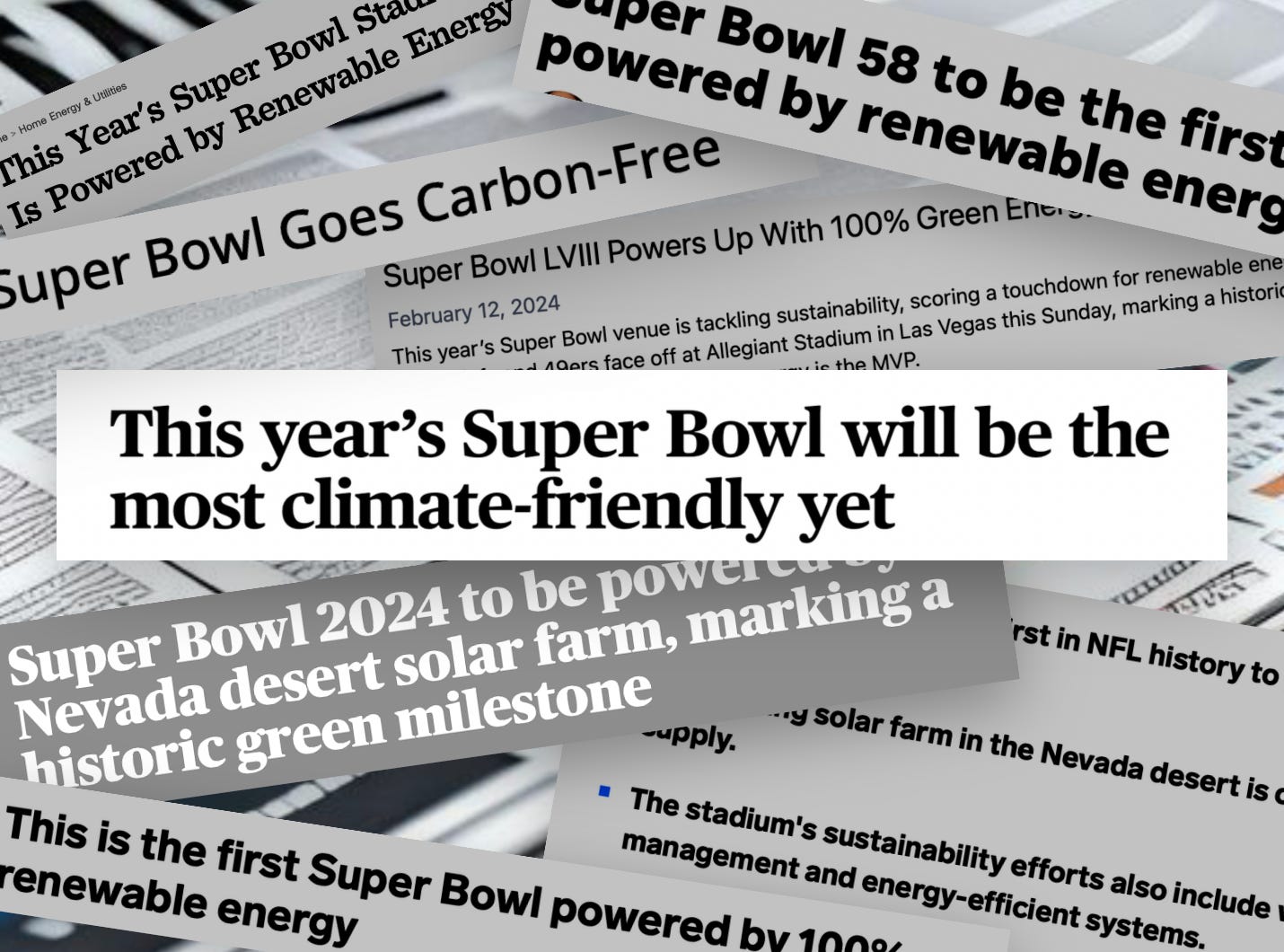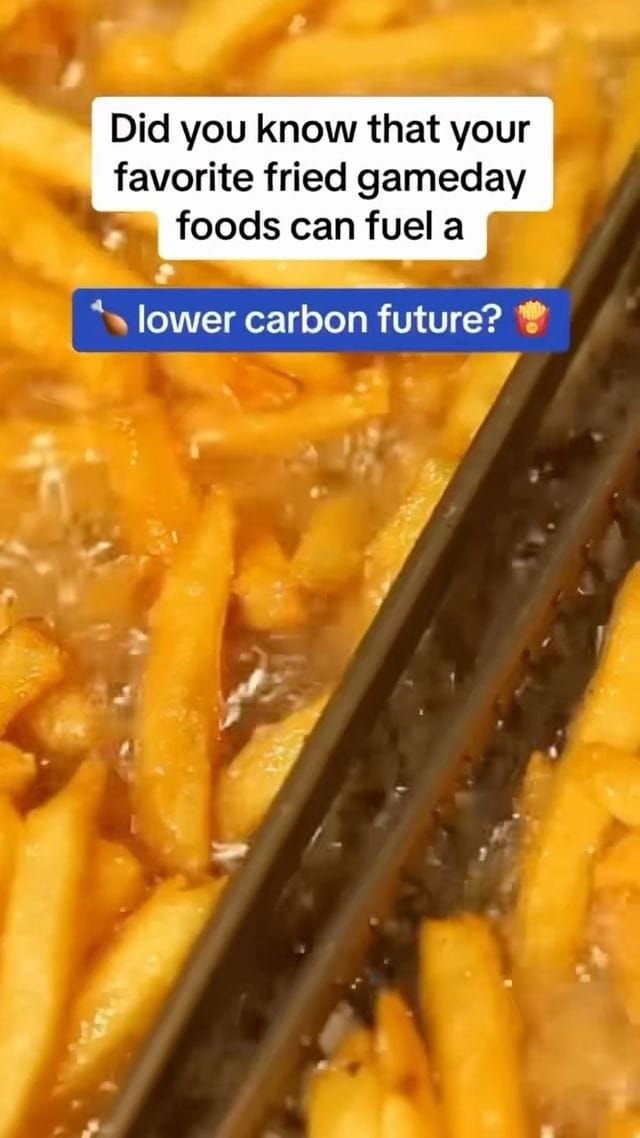There's no such thing as a “climate-friendly” Super Bowl
Welcome back to HEATED—Emily here. This happened a few times last week. I appeared on iHeart Radio’s Fast Politics podcast, hosted by journalist Molly Jong-Fast, to talk about the Biden Administration’s recent decision to pause permit approvals for new LNG export facilities. If you’d like to listen, I join around the 42 minute mark. (Fair warning: I was getting over a cold, so I’m a little stuffy.) There's no such thing as a “climate-friendly” Super BowlPlus, a round-up of climate highlights from the game.It’s time to have a conversation about the word “climate-friendly.” Like a football in the Super Bowl, it gets thrown around a lot. In recent months, journalists have used the word “climate-friendly” to describe reusable Stanley cups, carbon-neutral Apple Watches, and aviation powered by biofuels. It’s been used to describe investments in companies that have pledged to go net zero. And it’s been used to describe ice cream made with milk from cows fed special burp-reducing feed. If you watched the Super Bowl this year, apparently, that was “climate-friendly” too—or at least, the most “climate-friendly” the Super Bowl ever been. That’s because, for the first time, the host stadium—the Allegiant Stadium in Las Vegas—was powered entirely by renewable energy. Specifically, it was powered by the Arrow Canyon Solar Project, owned by local utility NV Energy. The vast solar farm and massive batteries powering the stadium weren’t the only green highlights at the big game either, as CBS News reports:
These actions by Allegiant Stadium and NFL Green are worth talking about, as they have the potential to become a powerful talking point in the energy transition culture wars. Just imagine: the next time you hear the claim that renewables don’t work—that fossil fuels are necessary to prevent the Dark Ages—you have a relatively easy and relatable counter. “Didn’t you watch the Super Bowl? Looked fine to me!” Related reading: Show this to anyone who says renewables are unreliable But as important as it is to recognize strides toward a sustainable future, it’s equally as important to guard against complacency. And using the word “climate-friendly” to describe the Super Bowl is a recipe for complacency, whether intentional or not. Make no mistake: There is no amount of solar power that could make the Super Bowl “climate-friendly.” That’s because the emissions from the Super Bowl do not come from the game itself. They come from absolutely mind-blowing number of private jets traveling to and from the game, and the mass-promotion of hyper-consumerism through advertising. This isn’t just something I’m guessing at. According to one estimate from sports researcher Ralf Roth, approximately 85 percent of emissions from major sporting events come not from the actual game, but from the travel and lodging of fans, particularly fans that are traveling by aircraft. And Roth’s estimate does not take into account the massive climate impact of sports advertising: One estimate from programmatic ad platform Good-Loop estimates that in 2021, “Super Bowl advertisers generated around 2 million tonnes of CO2 through digital advertising … the same amount of carbon emissions produced by around 100,000 Americans in one year.” What’s more, that estimate from Good-Loop only measures the carbon emissions of the ad impressions at the Super Bowl. It does not measure the carbon emissions of the products sold. This would be near-impossible to do, since you can’t really trace specific purchases to commercials people saw. But there’s a reason corporations pay $7 million for 30 seconds of Super Bowl ad time: because the Super Bowl is, at its core, an opportunity to get people to buy things. And buying things is a main driver of the climate crisis. Think about all those Super Bowl commercials. Out of everything you saw, what do you remember most? For me, it’s an infectious jingle from an e-commerce company called Temu—a company that reportedly sends more than a million packages around the world every day, and refuses to disclose any information about its climate impact. The commercial, which I saw at least three times during the broadcast, told me that I should “Shop like a billionaire.” But there’s a reason billionaires emit 1 million times more greenhouse gases than the average person on Earth. It’s because they shop. Like billionaires. So don’t let the excitement of a 100 percent renewable-powered stadium drive you into a state of delusion about what’s actually happening. The Super Bowl is still a massive climate pollution event. For it to become truly “climate-friendly”—aka, not adding any emissions into the atmosphere—it will have to change in ways that most people are not ready to think about. Anyway, here are some other climate-related updates from the big game, courtesy of Arielle: Lahaina football coaches and players did the coin tossThe Super Bowl opened with a reminder of the cost of the climate crisis. Players and coaches from the Lahainaluna High School football team served as honorary coin toss captains, a nod to the perseverance of the team in the wake of the August wildfires in Maui that devastated their community. One of the world’s worst plastic polluters aired a commercial about reducing wasteWhile we love seeing Kate McKinnon on our screens, we didn’t love seeing her star in a sneaky greenwashing ad by Unilever. The ad for Hellmann’s mayonnaise encouraged people to reduce food waste by adding mayo to their leftovers, using the slogan, “Make taste, not waste.”  It was an ironic sentiment, given Hellmann’s parent company Unilever is one of the most wasteful companies in the world. According to a recent Greenpeace report, Unilever produced 698,000 tons of plastic in 2022 alone. That plastic packaging—from brands like Hellmann’s, Dove, Vaseline—often ends up in the ocean, our food supply, and our bodies. The majority of Unilever’s pollution is from plastic sachets, or single-use packages usually used for condiments, cosmetic samples, and even detergent. Companies market plastic sachets in developing countries as a cheaper alternative to full-sized products. But those countries also bear the brunt of plastic pollution from those sachets—which aren’t recyclable or biodegradable. Unilever promised to phase out its plastic sachets two times: in 2010 and 2019. According to one company president, the sachet design is “evil because you cannot recycle it.” However, despite those promises, Unilever has continued quietly lobbying against laws banning the single-use sachets in Sri Lanka, India, and the Philippines, a Reuters investigation found. Three years after their pledge, Greenpeace reported that Unilever was on track to sell over 53 billion plastic sachets in 2023—a number equal to 1,700 plastic sachets per second. Chevron told viewers that their fried foods were solving the climate crisisEvery year, fossil fuel companies look for a way to use the Super Bowl to their advantage—from convincing viewers there would be no football without oil to sponsoring football teams. This year, none of the major fossil fuel companies shelled out $7 million for an ad on national TV. But social media greenwashing was still fair game. In an ad posted to Instagram and X, Chevron told Super Bowl viewers that their “favorite fried game day foods can fuel a lower carbon future.” Using cooking oil for fuel is “one of the many game plans we have to help us advance to a lower carbon future,” the company added. The ad was classic paltering—telling a small truth without context to mislead consumers about the true nature of its business. Because it’s true: Chevron recently paid $3 billion for a company that produces biodiesel. But the ad failed to mention that the company also produced a record 3.1 million barrels of oil per day in 2023, and made $21.4 billion last year primarily from oil and gas. Taylor Swift's private jet emissions took center stageYou didn’t think we could report on the Super Bowl without mentioning Taylor Swift, did you? The star took at least one, but potentially two private jets from Tokyo to Las Vegas to watch boyfriend Travis Kelce help the Kansas City Chiefs win their third title—an action which one climate scientist called “shockingly insane.” Later this week, Swift will fly across the Pacific again—this time to continue her Eras Tour in Melbourne, Australia. The roughly 29-hour trip could burn up to 8,800 gallons of fuel and emit 90 tons of carbon dioxide, according to the Washington Post. That’s a lot of carbon emissions for one person, especially since the average American releases 15 tons of carbon in one year. Swift has been under intense scrutiny for her private jet emissions in recent years, thanks to flight trackers like Jack Sweeney’s @SwiftJetNextDay. In response, Swift has threatened to sue the University of South Florida student, claiming through her rep that she buys carbon offsets. She also quietly sold one of her two planes. Catch of the Day: Today we’re happy to feature Lenny, a 2.5-year-old Siamese snowshoe mix. He is friendly, chatty, and mischievous, and a wonderful fur sibling. Reader Lisa and her family are grateful he came into their lives. Want to see your furry (or non-furry!) friend in HEATED? It might take a little while, but we WILL get to yours eventually! Just send a picture and some words to catchoftheday@heated.world.. You're currently a free subscriber to HEATED. For the full experience, upgrade your subscription. |
Older messages
“The Daily” runs a greenwashing BP ad
Tuesday, February 6, 2024
The Daily promised to end fossil fuel sponsorships in 2021. BP promised to stop “corporate reputation advertising” in 2020.
Understanding Biden's LNG decision
Thursday, February 1, 2024
There's a lot of politically-motivated misinformation floating around about it. Here's what's really happening.
“These streets should be paved with gold”
Tuesday, January 30, 2024
How a decade-long refinery worker became an anti-LNG campaigner
The propane industry is trying to dupe you
Thursday, January 25, 2024
Documents and recordings obtained by HEATED detail a multi-million dollar plan to spin the fossil fuel as "clean" and "renewable"
The fossil fuel executive inside the White House
Tuesday, January 23, 2024
As Biden faces the biggest climate decision of his term, he's hearing "concerns" from one of his closest advisors—who happens to be a former gas executive.
You Might Also Like
⚡ Amazon Lightning Deal! 12 Hours Only! ⚡
Saturday, March 1, 2025
Special Offer From our Friends at Good Housekeeping ⚡ Amazon Lightning Deal! 12 Hours Only! ⚡ View in Browser 28-day mediterranean diet. Alternating images of meals including chicken skewers and cous-
Weekend: Are My Married Friends Being Rude? 😤
Saturday, March 1, 2025
— Check out what we Skimm'd for you today March 1, 2025 Subscribe Read in browser Header Image But first: a cute (and inexpensive) tumbler for your morning coffee Update location or View forecast
Hit the Courts This Spring in Our Favorite Tennis Shoes
Saturday, March 1, 2025
If you have trouble reading this message, view it in a browser. Men's Health The Check Out Welcome to The Check Out, our newsletter that gives you a deeper look at some of our editors' favorite
"I Might Not Be Getting Anything Done, But At Least I'm Not Having Fun"
Saturday, March 1, 2025
Do Americans actually resist pleasure? ͏ ͏ ͏ ͏ ͏ ͏ ͏ ͏ ͏ ͏ ͏ ͏ ͏ ͏ ͏ ͏ ͏ ͏ ͏ ͏ ͏ ͏ ͏ ͏ ͏ ͏ ͏ ͏ ͏ ͏ ͏ ͏ ͏ ͏ ͏ ͏ ͏ ͏ ͏ ͏ ͏ ͏ ͏ ͏ ͏ ͏ ͏ ͏ ͏ ͏ ͏ ͏ ͏ ͏ ͏ ͏ ͏ ͏ ͏ ͏ ͏ ͏ ͏ ͏ ͏ ͏ ͏ ͏ ͏ ͏ ͏ ͏ ͏ ͏ ͏ ͏ ͏ ͏ ͏ ͏ ͏
“Fog” by Emma Lazarus
Saturday, March 1, 2025
Light silken curtain, colorless and soft, / Dreamlike before me floating! ͏ ͏ ͏ ͏ ͏ ͏ ͏ ͏ ͏ ͏ ͏ ͏ ͏ ͏ ͏ ͏ ͏ ͏ ͏ ͏ ͏ ͏ ͏ ͏ ͏ ͏ ͏ ͏ ͏ ͏ ͏ ͏
savourites 96
Saturday, March 1, 2025
escaping the city | abandoning my phone | olive oil ice cream ͏ ͏ ͏ ͏ ͏ ͏ ͏ ͏ ͏ ͏ ͏ ͏ ͏ ͏ ͏ ͏ ͏ ͏ ͏ ͏ ͏ ͏ ͏ ͏ ͏ ͏ ͏ ͏ ͏ ͏ ͏ ͏ ͏ ͏ ͏ ͏ ͏ ͏ ͏ ͏ ͏ ͏ ͏ ͏ ͏ ͏ ͏ ͏ ͏ ͏ ͏ ͏ ͏ ͏ ͏ ͏ ͏ ͏ ͏ ͏ ͏ ͏ ͏ ͏ ͏ ͏ ͏ ͏ ͏ ͏
5-Bullet Friday — How to Choose Peace of Mind Over Productivity, Guinean Beats for Winding Down, Lessons from Legendary Coach Raveling, and a New Chapter from THE NO BOOK
Saturday, March 1, 2025
"Easy, relaxed, breathing always leads to surprise: at how centred we already are, how unhurried we are underneath it all." — David Whyte ͏ ͏ ͏ ͏ ͏ ͏ ͏ ͏ ͏ ͏ ͏ ͏ ͏ ͏ ͏ ͏ ͏ ͏ ͏ ͏ ͏ ͏ ͏ ͏ ͏ ͏ ͏
Nicole Kidman's “Butter Biscuit” Hair Transformation Is A Perfect Color Refresh
Saturday, March 1, 2025
Just in time for spring. The Zoe Report Daily The Zoe Report 2.28.2025 Nicole Kidman's “Butter Biscuit” Hair Transformation Is A Perfect Color Refresh (Celebrity) Nicole Kidman's “Butter
David Beckham's Lifestyle Keeps Him Shredded at 50
Friday, February 28, 2025
View in Browser Men's Health SHOP MVP EXCLUSIVES SUBSCRIBE David Beckham's Lifestyle Keeps Him Shredded at 50 David Beckham's Lifestyle Keeps Him Shredded at 50 The soccer legend opens up
7 Home Upgrades That Require Zero Tools
Friday, February 28, 2025
Skype Is Dead. There are plenty of ways to make quick improvements to your house without a single hammer or screwdriver. Not displaying correctly? View this newsletter online. TODAY'S FEATURED



